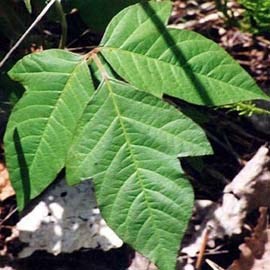
"Leaves of three, leave them be!" Poison Ivy is plentiful throughout Gauley River National Recreation Area. The plants may grow as a shrub up to about four feet tall, as a groundcover four to ten inches tall, or as a climbing vine that sends out branches appearing as tree limbs. The colors of poison ivy vary from light to dark green, turning bright red to orange and yellow in the fall; the leaflets may be shiny or dull. Poison ivy produces an oily skin irritant that causes an itching rash. Reactions to poison ivy tend to be worse in the spring and early summer when the leaves are tender. Most people develop symptoms in within a few hours or days of contact with the plant. Symptoms normally begin with severe itching of the skin, followed by redness and blistering that may last for about a week. The best prevention is to avoid contact; however, if exposed wash the affected area with soap and cold water as soon as possible. It takes several minutes for the oil to penetrate the skin. Topical steroid creams and calamine lotions can help relieve symptoms. Severe rashes, especially those in sensitive areas, or rashes accompanied by fever should be examined by a physician.
|
Last updated: November 14, 2017
